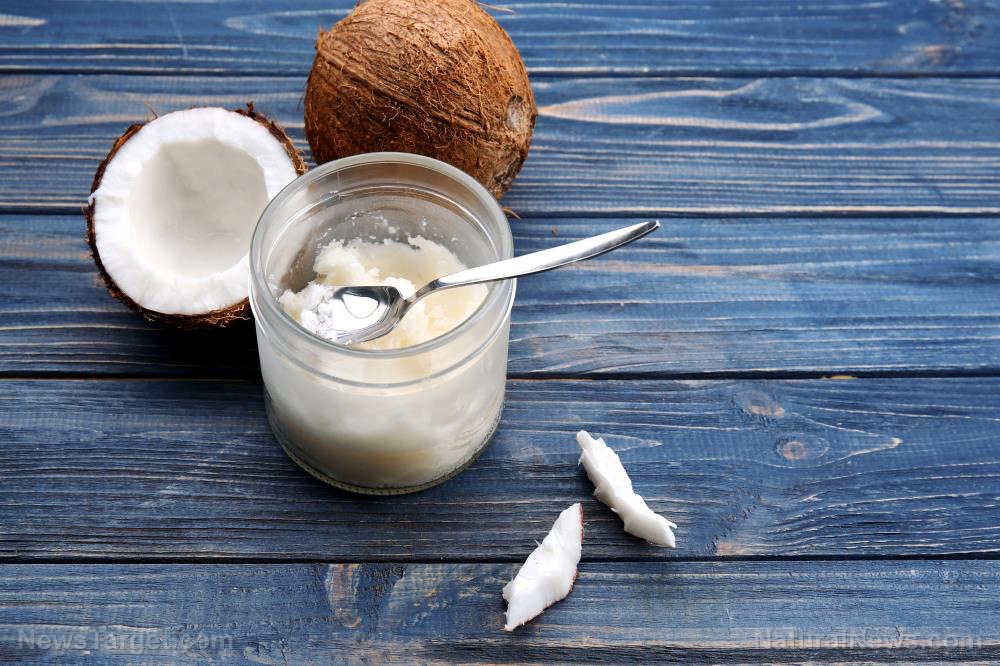Lower your risk of kidney disease by supplementing with virgin coconut oil
07/15/2020 / By Divina Ramirez

Supplementing with virgin coconut oil (VCO) may help protect the kidneys from the damaging effects of diabetes, suggest researchers from Cross River University of Technology and Bowen University in Nigeria. In their report, published in Folia Medica, the team looked at whether adding VCO in diet can improve kidney function parameters using a diabetes animal model.
High blood glucose can damage the kidneys
Diabetes mellitus, also called diabetes, can lead to major complications, especially in the kidneys. About a quarter of people with diabetes develop diabetic nephropathy, or diabetic kidney disease. Some common symptoms of diabetic nephropathy include high blood pressure or poor blood pressure control, an increased need to urinate, shortness of breath and gastrointestinal complications.
If left untreated, the disease can lead to decreased kidney function, or even total kidney failure, causing unsafe amounts of toxins and harmful substances to accumulate in the blood.
Despite its potentially serious consequences, it is possible to stall the onset of nephropathy and most other kidney problems and complications. Findings from animal-based research, test-tube studies and clinical trials indicate that nutritional treatments, such as those that use health foods and plant medicines, are capable of halting the progression of kidney disease or preventing its onset altogether.
Supplementation improved kidney function parameters
Given how diabetes can affect the kidneys and lead to more serious complications, scientists are considering therapies outside medications and synthetic drugs, in particular, looking into the kidney protective effects of certain diets and health foods. (Related: Easily avoid kidney disease by improving your diet.)
One such health food is VCO, a pure and unrefined edible oil extracted from the meat of mature coconuts. In tropical countries, traditional healers use this oil to treat a range of infections and diseases, from eczema to heart disease. Past studies on coconut oil also affirm that it is a great source of potent antidiabetic and antioxidant compounds, such as tocotrienols, capric acid, caproic acid and lauric acid.
To examine the effects of these compounds on renal function parameters in diabetic rats, the researchers conducted an experiment on 25 male rats. The rats had been divided into five groups: non-diabetic control, diabetes control, diabetes and metformin, diabetes and 10 percent VCO and diabetes and 20 percent VCO.
After diabetes induction in the experimental groups, the rats had to undergo a 72-hour fast to ensure high blood glucose. The researchers then placed all five groups on a normal rat chow diet for eight weeks. After eight weeks, they assessed renal function in the three experimental groups to confirm kidney dysfunction. They then placed the rats in the experimental groups on modified diets that had either 100 milligrams of metformin, an oral diabetes medicine, per kilogram of body weight and 10 or 20 percent VCO for four weeks.
Both the non-diabetes and diabetes control group continued to be fed the normal rat chow diet for the remainder of the trial.
After the remaining four weeks, they collected the rats’ urine and blood samples to assess renal function parameters, including glomerular filtration rate (GFR) and albumin, among others. A low GFR number indicates that the kidneys are not functioning properly. Similarly, low levels of albumin can indicate renal problems.
Their analyses revealed that VCO supplementation prevented the enlargement of the kidney, a common symptom of nephropathy.
The team also found that the GFR in the VCO groups had significant improvements compared to that of the diabetic control group. Additionally, they found a significant increase in the albumin of diabetic rats that received VCO supplementation.
Furthermore, the blood glucose of those in the experimental groups also significantly decreased compared to those in the diabetes control group. That said, their blood glucose was still significantly higher compared to those in the non-diabetic control group. Taken together, their findings affirm that VCO supplementation can enhance renal function parameters and ameliorate the harmful effects of diabetes on the kidneys.
Based on these findings, the researchers thus concluded that VCO supplementation can prevent, reverse and improve the adverse effects of diabetes on kidney physiology and renal function parameters.
Read more articles about the health benefits of VCO and other healthier oils at FoodIsMedicine.com.
Sources include:
Tagged Under: alternative medicine, anti-diabetes, biomedical research, coconut oil, Diabetes treatment, disease treatments, food cures, future science, kidney disease treatments, natural cures, natural medicine, prevention, remedies, virgin coconut oil
RECENT NEWS & ARTICLES
COPYRIGHT © 2017 PREVENTION NEWS




















